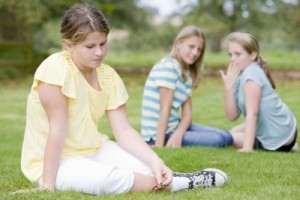Recognizing the Signs of Bullying
In 2011, the Center for Disease control and prevention announced that 20% of children in grades 9-12 have experienced bullying. Bullying is not just a mean comment on the playground but a serious offence that shouldn’t be taken lightly. Now, children of all ages have access to a cellphone and computer. Bullies can take this opportunity to tease another child relentlessly.
What Is Bullying?
In order to be considered bullying the behavior must be aggressive and include:
Power: Children who bully use their power to harm others. Power can be strength, popularity or access to embarrassing information.
Repetition: The behavior must occur on a regular basis.
Types of Bullying
Bullying can come in a number of forms:
Verbal Bullying: Teasing, name calling, taunting, threatening to cause harm
Social Bullying: Hurting another child’s reputation or relationships, leaving someone out on purpose, spreading rumors about someone, embarrassing someone in public, telling other children not to be friends with someone
Physical Bullying: Hitting, kicking, punching, spitting, tripping, taking or breaking someone’s possessions, making mean hand gestures
Bullying Warning Signs for Parents
If you are worried that your child may be a victim of bullying or bullying other children, look out for the symptoms listed below. Click here for a complete list of bullying warning signs
Victim Signs and Symptoms
- Appears depressed, mood shifts unexpectedly and may have sudden outbursts of temper
- Begins to lose interest in school and grades suffer
- Comes home from school with torn clothing or damaged books
- Appears socially isolated with very few friends and is rarely invited to other children’s homes or parties
- Reluctant to go to school everyday and may come up with “illnesses” such as headaches or stomach pains as an excuse to stay home
Bully Signs and Symptoms
- Brags about his or her superiority over other children
- He or she is easily angered, has a low frustration tolerance and impulsive
- Anti-social and acts out criminal behavior such as stealing or vandalism, often at an early age
- Demonstrates defiant or aggressive behavior towards adults
- Has a strong need to assert power over others
Advice for Parents When Dealing with Bullying
If you suspect your child is being bullied, contact your child’s teacher right away. Even though it might be difficult, stick to the facts without getting overly emotional or threatening. Be ready with factual information such as dates, times and names of the bully or bullies.
If your child is accused of bullying others, take the accusations seriously. Don’t come up with excuses for your child. Don’t believe everything your child tells you; bullies can be good at manipulating adults. You should explore the reasons for your child’s bullying and seek professional help if necessary.
For more resources and tips for both bullies and victims visit:
https://www.greatschools.org/special-education/health/825-what-parents-can-do-about-childhood-bullying.gs
https://www.stopbullying.gov/what-is-bullying/definition/index.html
For information about the Round Rock ISD bullying policies and resources visit: https://www.roundrockisd.org/index.aspx?page=3962


 Previous Post
Previous Post Next Post
Next Post



